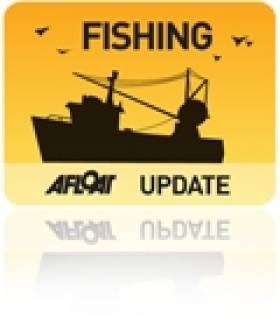Displaying items by tag: Tom MacSweeney
New Safety Regs Anger Fishermen
Counting the Cost of New Fishing Boat Regulations
The cost of upgrading fishing boats to comply with new regulations first mooted three years ago means some boats cannot put to sea again. It's a move that will cost hundreds of jobs to coastal communities says Tom MacSweeney
The nation may be reeling from the revelations about Anglo Irish Bank and AIB. The fishing industry is reeling from another shocker. While earlier this week it cranked up its PR machine in an attempt to convince the public it was going to create jobs, the reality is that this Friday, October 1, it wiped out at least 200 and the overall effects of what it has done may throw as many as 800 people out of work in coastal areas.
That is callous disregard for people and underlines the disinterest and disrespect which the Government has for the maritime sector.
These jobs are in the fishing industry and are being lost because of a decision by the Department of Transport that smaller fishing boats, ranging in size from 15 to 24 metres must conform to the same safety standards as bigger boats, those over 25 metres, even though they operate under different fishing methods.
There can be no argument against safety, but there should be moderate, reasonable implementation of regulations. To quote the Taoiseach in his own recent defence, "moderation in all things." There are 99 boats in the Irish fleet in the 15-24 metre category. These are, effectively, day boats which operate in inshore waters, close to land. The Department has decided to implement regulations requiring them to conform to the same standards as bigger vessels that operate farther out to sea for extended periods.
Of the 99 boats nationwide faced with the implementation of the new regulations, 39 have not applied for certification, apparently because owners could either not afford the costs of upgrading the boats to the higher standard or felt the vessels would not be able to meet those standards, irrespective of how much money was spent on them. Those 39 boats have to be tied up, unable to go fishing any longer, another blow to the Irish fishing fleet. Their owners and crews will face unemployment.
The total number of jobs lost nationally could be up to 800, according to fishing organisations, when those whose livelihoods ashore depend on the 200 direct fishing jobs are added.
The Department makes the point that it has been known for three years that these new regulations would be imposed and that there has been ample time for owners to upgrade. Fishing organisations asked the Minister for Transport, Noel Dempsey, who also holds the brief of marine safety, to establish a separate category of safety requirements applying specifically to the smaller boats. Dempsey, who has not been a friend of the fishing industry, refused. So around 200 fishermen are out of work, directly due to a Government decision. It has not been explained why different regulations cannot be applied to different sizes of boats.
The sight of more Irish fishing boats tied to the quay wall, stopped by Irish Government regulations from working will not be pleasant.
• This article is reprinted by permission of the CORK EVENING ECHO in which Tom MacSweeney writes maritime columns twice weekly. Evening Echo website: www.eecho.ie
Why Boating and Music Go Hand-in-Hand
It runs a "Discover Boating" national awareness project creating interest amongst the public in going afloat. "We identified the most popular nautical-themed songs from a variety of artists and genres, all of which illustrate why boating and music go hand-in-hand," said Carl Blackwell, the Association's Vice-President running the project. "They illustrate why boating and music go hand-in-hand, the wind in your hair, sun on your face, friends and family aboard. Music and boating provide an escape from the pressures of life."
Kenny Chesney's song 'Boats' has been voted the top boating son in the USA
These are the Top Ten Boating Songs:
BOATS – sung by KENNY CHESNEY;
BRANDY YOU'RE A FINE GIRL BY LOOKING GLASS;
COME SAIL AWAY BY STYX;
IF I HAD A BOAT BY LYLE LOVETT;
INTO THE MYSTIC BY VAN MORRISON;
PROUD MARY BY CREEDENCE CLEARWATER REVIVAL;
REDNECK YACHT CLUB BY CRAIG MORGAN;
SITTIN' ON THE DOCK OF THE BAY BY OTIS REDDING;
SON OF A SON OF A SAILOR BY JIMMY BUFFETT;
SOUTHERN CROSS BY CROSBY, STILLS & NASH.
These are chosen from an American viewpoint, I wonder what an Irish list would include? Let me know in the comment box below.
WIND PLAN WILL CHANGE THE HARBOUR
Wind turbines have become an established feature on the coastline and around many parts of the country. Controversy has often surrounded their construction as an alternative energy supply. Wind turbines nearly four hundred feet high which would change the appearance of Cork Harbour are being proposed by four pharmaceutical companies in Ringaskiddy. They want cheaper energy and have formed the Lower Harbour Energy Group. GlaxoSmithKline, Novartis, Centocor and DePuy plan to construct a total of turbines between their sites. Public response to the proposals will be interesting. Indications are that the body of the turbines would be 78 metres, the blades a further 40 metres high, making a total of around 118 metres.
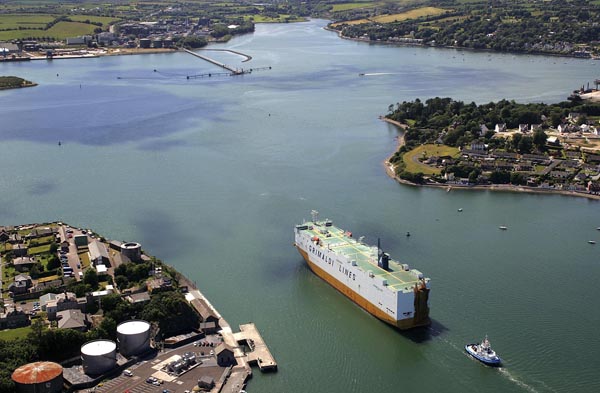
A cargo ship navigates Cork Harbour. Photo: Bob Bateman
There are serious concerns about 336 offshore turbines around the UK coastline, because their foundations are suffering from subsidence, sinking into the sea. Checks are being made on a wind farm off Essex
another in Liverpool Bay, of turbines at Blyth, Northumberland and Robin Rigg in the Solway Firth. If repairs have to be made to all of them, the total bill could be £50m. stg.
The Scottish Government is attempting to encourage Norwegian Statoil to locate the world's first floating windfarm either off the Isle of Lewis or the Aberdeenshire coastline. Statoil is also considering sites in Norway and the USA for the development, intended to have a capacity of up to 100 megawatts.
• This article is reprinted by permission of the CORK EVENING ECHO in which Tom MacSweeney writes maritime columns twice weekly. Evening Echo website: www.eecho.ie
Success at Last!
The world trophy for offshore cruiser racing is in Irish hands and Cork has dominated the successful assault on the Commodore's Cup in the hallowed waters of Cowes, centre of British yachting writes Tom MacSweeney.
Several times in previous years the Irish team were favourites, leading the event, with the cup seemingly in their grasp, but were beaten on the last day of the event. This year they led from the opening day. Maintaining their lead to the finish after five days of racing.
Putting just one team of three boats into the competition this year proved the best approach. Like other competing nations such as the UK and France, Ireland had entered previously entered several teams. But the result was internal rivalry that did not bring overall Irish victory.
On Saturday last as the Commodore's Cup fleet of 30 boats, representing 10 nations, headed into the Solent off Cowes for the final day's racing, Ireland was again in the lead. The crews of the Irish team's three boats - Antix, Marinerscove.ie and Roxy 6, were conscious of what had happened to their predecessors and how victory had been snatched away on the last day.
Throughout the week they had built a commanding lead, each of the team boats achieving top fleet positions racing in three different classes. It seemed they were almost certain to win the cup, but those thoughts were being forced aside, almost as if concentrating on them might jinx the final outcome.
With the team boats all from the Royal Cork, one competing in each class, the sailors all knowing each other, there was to be no repeat of previous years. Then there had been internal skirmishing between the several Irish teams on the final day, jockeying for positions, but seemingly focus to bring overall victory.
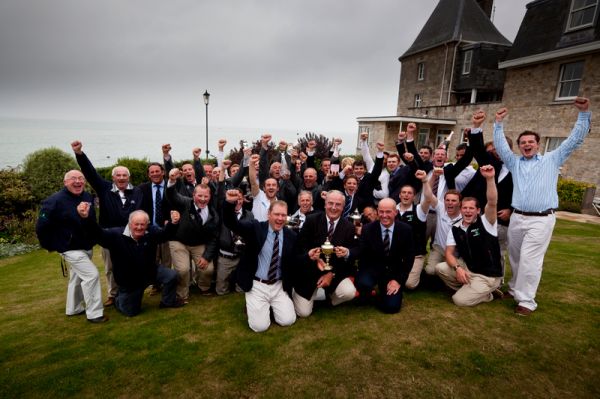
Ireland celebrates victory in Cowes last weekend. Photo: David Branigan
There was plenty of skirmishing and jockeying with opponents on the start line for the final race last Saturday when one French boat tried to protest Antix out of Class 1 in an incident before the start. Anthony O'Leary, skippering Antix, kept his cool and took a penalty time turn allowed under the rules, avoiding what could have been a messy protest. The crew of Antix sailed her so well that she made up lost time at the start during the race. When the French protested at the end of the race, they lost out, having overlooked that Antix had taken the penalty before the race started
Sweet justice for an Irish team when one remembers what happened in another world cup sport!
Strong, gusty winds, dominated the final day, but all three Irish boats sailed well. Antix finished second in Class 1, while Dave Dwyer's Marinerscover.ie revelled in the conditions with another first place in Class 2 while Rob Davies' Roxy 6 was second in Class 3, keeping the Irish team out in front, aggregated on the overall results.
At the rather upper class Royal Yacht Squadron in Cowes, it was a great sight when the 50-strong Irish contingent of crews, team management and shore support staff were invited on stage at the presentation ceremony. Their haul of prizes included being the best European team at the event, the best team in both offshore and inshore races during the week and of course, the Commodore's Cup, a long-awaited victory.
After the formalities, Cowes echoed to the sound of the Irish singing The Fields of Athenry in the Pier View pub which had been unofficial headquarters for the team during the week.
The team was organised by the Irish Cruiser Racing Association under the auspices of the Irish Sailing Association. Management was led by Commodore Barry Rose from the RCYC, with Denis Kiely from Kinsale Yacht Club; Mike Broughton, Norbert Reilly and Fintan Cairns, former ICRA Commodore. He had led previous attempts to win the cup.
This is a great achievement, adding to the standing of Irish sailing internationally. All those involved, the boat owners, skippers, crew, team management and shore support deserve the highest praise. That Cork has had such a dominant involvement in Ireland's victory is marvellous.
In youth sailing, Cork sailors are continuing to stamp their mark nationally. I have been highlighting the achievements of young Optimist sailors, which were added to at the national class championships, sailed at Waterford Harbour Sailing Club. This is based in Dunmore East where huge swells are typical conditions as the seas roll into that fishing port.
Peter McCann from the Royal Cork sailed magnificently to become Senior Open and National Champion. Second to him was Peter Crosbie, also from the RCYC. Daire Cournane, a member of both the RCYC and Kinsale YC dominated the junior fleet, winning the open and national championship titles.
Another young sailor has caused so much controversy that the World Sailing Speed Record Council has decided it will no longer give recognition to records for "youngest" sailors, "to avoid encouraging dangerous sailing attempts." Guinness World Records has made a similar decision. Both were announced as 14-year-old Dutch girl Laura Dekker began a bid to become the youngest person to sail alone around the world. She had planned to leave from Portugal, but Portugese law does not allow minors to sail alone. So she left from Gibraltar instead.
A Dutch Court previously blocked her attempt at the request of child protection agencies, though her parents, experienced sailors, have supported her. Born on a yacht, she maintains she is competent to make the voyage which will not be non-stop. Dekker will call at several ports.
Earlier this year Australian Jessica Watson completed a non-stop 210-day round-the-world voyage at the age of 16. In June another 16-year-old, Abby Sunderland, was rescued in the Indian Ocean when she and her boat got into difficulties.
If Laura Dekker does complete her voyage, it will not get official record recognition.
• This article is reprinted by permission of the CORK EVENING ECHO in which Tom MacSweeney writes maritime columns twice weekly. Evening Echo website: www.eecho.ie
Privatisation of the Ports Should be Strongly Opposed
In the first installment of a new weekly maritime blog on Afloat.ie, marine correspondent Tom MacSweeney says our ports are vital national assets;
It astonishes me that the Government should consider selling off the country’s ten major port companies - Dublin, Cork, Dun Laoghaire, Waterford, Shannon/Foynes, Drogheda, Galway, Wicklow, New Ross and Dundalk.
Ninety-five per cent of Irish exports and imports go by sea through our ports which are the vital entry and exit points of our transport system. To consider privatising them is an example of how unaware the Government is that Ireland is a small island community on the periphery of Europe.
The lesson of transport chaos caused by the Icelandic ash grounding aircraft this year has not been learned. It demonstrated how vital maritime transport is to this island nation.
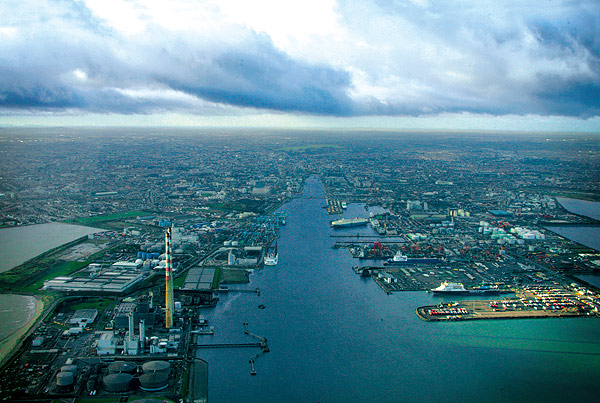
Dublin Port Company - a profitable state company
This is a smash-and-grab raid, redolent of a bankrupt Government philosophy. It is one thing to consider selling off the family jewels when, at least, the householder would still have access to the house. To sell off the ports is akin to the householder selling off the driveway, porch and front door to the house, then having to pay for the right to use them to enter the house in the future.
The Government has failed to develop a national ports policy. In the Progressive Democrat-fuelled era when privatisation, competition and profits were its driving force, the ports were moved out of direct State ownership and turned into semi-State competing bodies. Iarnrod Eireann was permitted to largely opt out of rail freight operations through the ports. Turned loose to compete against each other, the port companies followed no overall national policy for the benefit of the nation and now their future has been put in the hands of a group whose chairman advocates the sale of State companies and has already shown a lack of concern for the marine sector by shutting down the national sail training programme.
Aspects of journalism these days disappoint me after 45 years in the profession. Colm McCarthy who led Bord Snip Nua, is now chairing what is, effectively, ‘board privatisation,’ yet sections of the media seem largely to accept his views without question. I have not seen a lot of reportage which refers to his scathing opposition to the building of the DART, the Dublin Area Rapid Transport system, which he described as financial insanity and profligacy. Had those views been accepted, there would be no DART in Dublin, the consequences of which today are interesting to consider.
Privatisation of the ports should be strongly opposed. These are vital national assets. The lesson of selling-off Eircom has also, apparently, been forgotten by the Government.
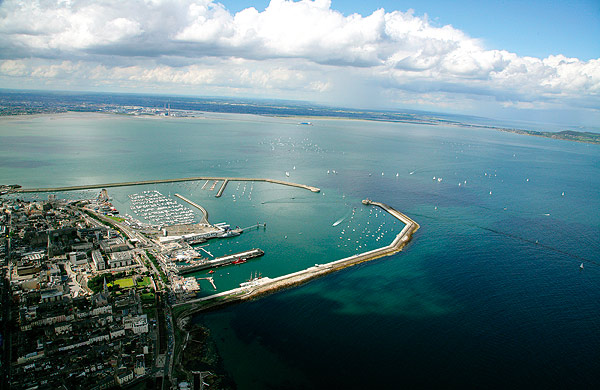
Dun Laoghaire Port on Dublin Bay
A Republic should be an entity in which there is open debate about public policy, not decision-making by elites. Flogging off our best assets, which is what this move by the Government is about, will not solve the nation’s problems. It is shocking to think that money from the sale of our vital transport arteries, the ports, could go to benefit those property speculators and banks which have bankrupted this nation.
This article is reprinted by permission of the CORK EVENING ECHO in which Tom MacSweeney writes maritime columns twice weekly. Evening Echo website: www.eecho.ie


























